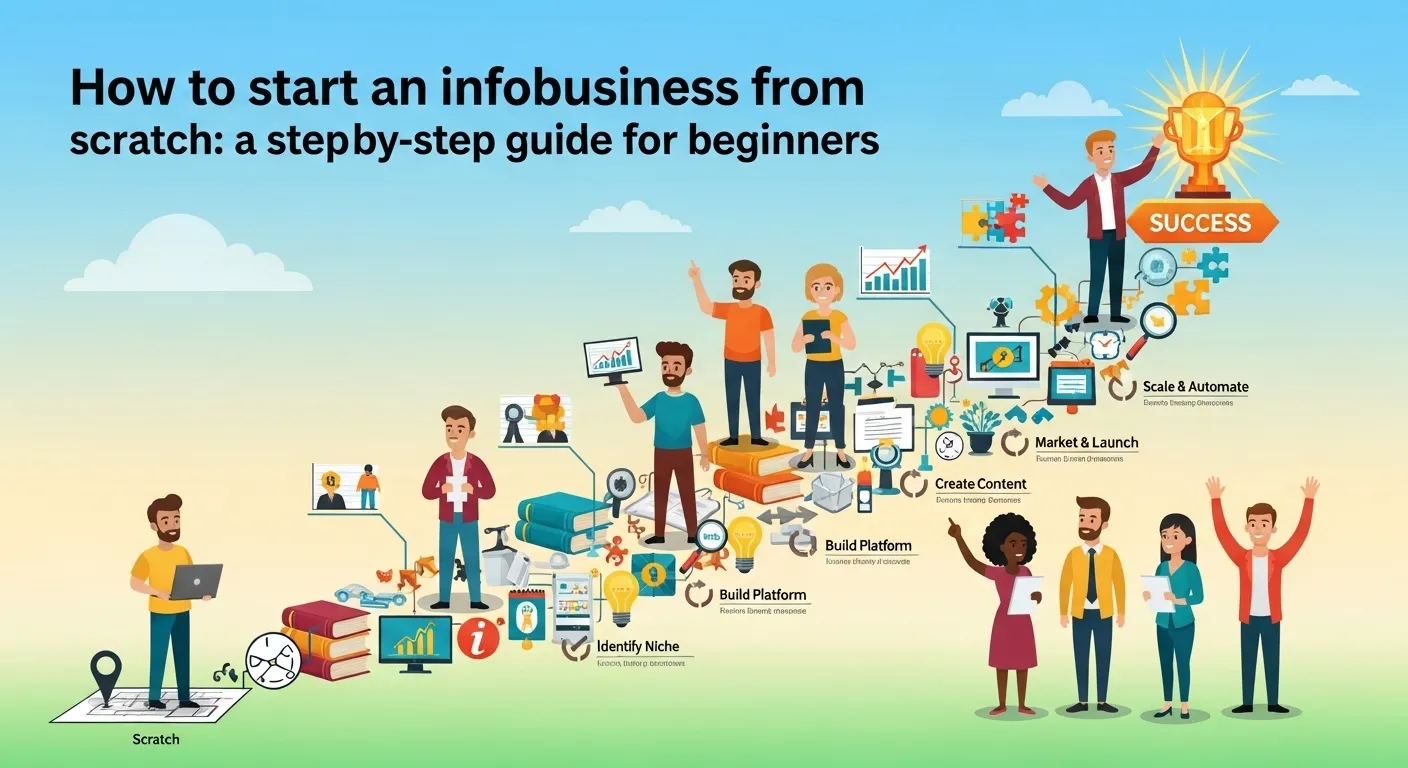How to launch an infobusiness from scratch: a step-by-step guide for beginners
In 2025, infobusiness remains one of the most effective ways to transfer valuable knowledge to an audience and, at the same time, create a stable source of income. Many Ukrainian and global specialists have already successfully launched their own online courses, but for beginners, questions often remain open: where to start, what steps need to be taken, what tools to use? The online education market is growing every year, and the demand for quality practical knowledge is gaining momentum. In this article, we will step-by-step analyze how to launch an infobusiness from scratch, what pitfalls may await, and what this path actually offers – both for beginners and for those who want to systematize their knowledge or build a full-fledged online project.
What is infobusiness: basics and modern formats
Infobusiness is a business of transferring expert knowledge or experience through digital products: online courses, webinars, master classes, consultations, or educational subscriptions. The main value is not the information itself, but its structure, relevance, and accessible presentation.
The global e-learning market in 2025 exceeds $400 billion, confirming the relevance of the niche. The main formats are:
- Video courses (sold through your own platform or marketplaces);
- Live webinars with recorded access;
- Mini-course via email or Telegram bot;
- Consultations, mentoring programs.
Step 1: Define your expertise and target audience
The first and most important step is to define your unique selling proposition. Think about what skills or knowledge you can transfer to others. These can be professional skills (design, marketing, programming) or hobbies (photography, music, cooking). Next, outline the portrait of the ideal student:
- What problem do you solve?
- Who are these people: age, gender, knowledge level?
- What channels do they use to get information? (Instagram, Facebook, Telegram, etc.)
Important: specificity and focus on your audience's pain points increase the chances of launching a successful course.
Step 2: Create a course structure and content plan
The main question for beginners: how to systematize knowledge and turn it into a product? It's simple – create a detailed content plan. Break down the training into separate lessons and modules. For greater effectiveness, use the principle of “from simple to complex.”
Here is an approximate structure:
- Basic block: brief theory, main concepts;
- Practical part: cases, tasks, error analysis;
- Homework or tests;
- Summary module: answers to common questions, feedback.
Tip: use visual materials, clear examples, interactive elements.
Step 3: Choosing a platform for launching an infobusiness
The success of a launch largely depends on the chosen technical platform. Nowadays, it's not necessary to create your own website from scratch – you can use ready-made LMS platforms, for example, the Ukrainian service
UseUme. Thanks to such platforms, you can:
- Create a course in 1 day;
- Set up modules, lessons, homework;
- Store content (videos, documents, presentations) in a convenient cloud storage;
- Accept payments and connect automatic mailing;
- Set up access by days, connect Telegram bots for instant notifications.
This will help automate the launch, avoid getting distracted by technical nuances, and dedicate more time to promoting the product.
Step 4: Packaging and promoting your information product
A successful infobusiness is not just about content, but also about smart packaging:
landing page design, relevant testimonials, clear description of benefits. Make the page as clear as possible – use short blocks, video presentations, simple answers to frequently asked questions. Add testimonials or student case studies, even if there are only a few.
For promotion, use social networks, collaborations with experts, targeted advertising campaigns, email newsletters. Important – first get initial feedback, even if it means conducting a free or pilot launch.
Step 5: First launch — testing and gathering feedback
The first cohort often differs from the ideal. Launch a “minimum viable version” of the course; let students go through lessons and leave feedback. This way, you'll see what works and what needs refinement. In UseUme or another LMS, it's easy to track student activity, homework completion, and collect statistics. Don't be afraid to make mistakes – the main thing is to get feedback and quickly adjust the program.
TOP-3 common beginner mistakes and how to avoid them
- Too much information. Don't try to fit everything into the first course — focus on the key elements.
- Lack of feedback. Engage students through chats, groups, personal comments, so the course isn't “one-sided.”
- Ignoring promotion. Even a quality product won't sell itself — allocate time and budget for marketing.
Conclusion: when is it worth launching an infobusiness
Anyone with experience or knowledge and a desire to help others can master launching an infobusiness from scratch. The secret to success is to test, listen to your audience, and don't be afraid to experiment with formats. Online education allows you not only to monetize your expertise but also to reach a new professional level, impacting the lives of others. Start small – and gradually create your own unique educational ecosystem.
